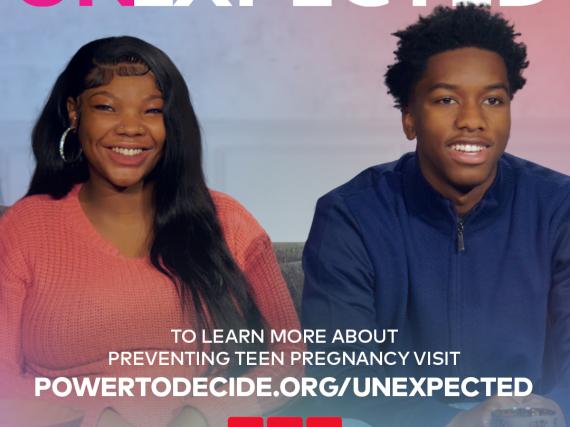A Native Judge’s Fight for Equity Pt. 2
This past summer, JeNeen Anderson—our lead When You Decide Toolkit Trainer—trained Judge Swimmer and a number of other Eastern Band community stakeholders on best practices for integrating teen pregnancy prevention materials inside and outside of the courtrooms. This was Power to Decide's first opportunity to work with Native judges to address teen pregnancy. If you missed part one of this two-part series, check it out here.
We had the opportunity to catch up with Judge Swimmer to get a firsthand perspective on what it means to be a Native judge serving the Eastern Band Tribe of Cherokee Indians and how she plans to implement the When You Decide Toolkit in her courtroom. Here's what she had to say:
De'Jonnae: Judge Swimmer, I actually was reading another community leader's recount on the perception of sexuality in the native community and how taboo sex and sexuality are. What's your opinion on this? Would you agree with this perspective?
Judge Swimmer: In the Cherokee Tribe, women were often involved in politics and leadership. In addition, we were a matrilineal society so patriarchy was not our tradition. Women and men balanced one another. Sexuality and sexual exploration was not considered taboo until Christian missionaries came and forcefully willed religious conversions upon our tribe. Women are now more likely to be subservient, in hopes of being considered 'holy and virtuous.' Colonialism and forced religious conversions changed our narrative around sex and relationships.
De'Jonnae: When we first received your When You Decide Toolkit application, you mentioned the many hardships the youth in your community face. You also mentioned that in your community you're working towards restorative justice and alternative solutions. In what ways are you hopeful that the toolkit will empower you and your restorative justice efforts?
Judge Swimmer: The thing that really caught my attention about the When You Decide Toolkit is the scripts for starting conversations with at-risk teens. These scripts are really helpful because we know as adults what we want to communicate to our youth and how we want them to receive it. But the issue is that we don't know how to start the conversation! Most people in our community know there's a problem but they don't know how to be the trusted adult that kids need. So, the script is helpful—knowing that these are conversation starting prompts, that have worked with other judges, is reassuring. The toolkit arms our leaders and other trusted adults with the important information needed to have those hard conversations.
When individuals in the community say "I want to do something to help but I don't know how," I can pass along this information because with these scripts anyone can help. I'm hopeful that if we can get this toolkit into hands of community leaders, tribal counselors, and others it'll be what we need to further our restorative justice efforts.
De'Jonnae: During the When You Decide Toolkit training, participants are asked to create action items to implement in their courtrooms or spheres of influence. What are some of the things you listed as action items to implement in your jurisdiction?
Judge Swimmer: For starters, one of my action items is to form a transportation commission. In rural areas, like ours, getting basic health care or going to your gynecological appointment can be a serious hassle. When we're talking about foster care and system youth, we're talking about the social worker who will have to pick that kid up from school, drive them one hour to the appointment, wait with them during the appointment, then drive them back to the school. That's a four to five-hour chunk out of that social worker's day—which means she isn't able to help the other youth on her docket.
We also want to get these foster kids in after school activities, maybe guitar or dance lessons—but again, they'll need transportation and we don't want to burden the foster parents.
So, we've started the conversation among stakeholders to see how we can resolve this issue. Maybe it's a community-wide carpool or a shuttle, we're working together to figure out the best solution. The good thing about the toolkit training is that it has really challenged our community to begin connecting the dots to see where our resources are and how we can utilize them in the best way possible.
If we're going to prevent teen and unplanned pregnancies among at-risk youth, we have to first create opportunities for get them to realize their full potential.
De'Jonnae: What role does culture play in this?
Judge Swimmer: Teen pregnancy prevention isn't the central focus for me, it is, indeed, a by-product. We're in a rural area so there aren't as many options for kids to get involved. But we want these kids to learn socialization skills. We want them interacting with other humans. We're trying to give them a sense of appreciation for their heritage and culture –we're teaching these kids about their roots. We're having conversations like: "this is what it means to be a Cherokee woman."
We are really trying to foster a deeper sense of identity, because our youth don't know who they are. Their risky behaviors are a result of a lack of identity. If we can get them to identity with their heritage, it opens the door for them to build self-esteem and think about their future stories.
We, as trusted adults, need to heal our kids. There's a saying that goes, "hurt people, hurt people." So, we need to transform their pain so it isn't transmitted. When you're working with Native kids, the root of risky behaviors is something very different than kids in other communities. These kids are trying to mask years of trauma and abuse. These risky behaviors are not a phase for them, they're coping mechanisms. As these kids' mentors, we are trying to address the hurt and remind them that their lives matter.
De'Jonnae: In a perfect world, how does the implementation of the When You Decide Toolkit play out in your community?
Judge Swimmer: In a perfect world I wouldn't have a job. When I talk about alternative dispute resolution and restorative justice, I imagine that we are able to handle these issues within our community. The court system isn't based on the Native tradition of restorative justice. In the American legal system, we aren't necessarily taught to look at why the person did what they did; we aren't taught to address the root causes; and we don’t evaluate the intergenerational trauma. But once we are able to tackle these root issues we will see a drop in the abuse of drugs, domestic violence, and teen pregnancy. I want to get to a point where the community comes together. Where jail isn't the only option–but we're figuring alternative solutions to heal broken individuals.
De'Jonnae: Any final thoughts, Judge Swimmer?
Judge Swimmer: The training was so collaborative. It started the conversation on how we can all work together to be the change we want to see in our community. Just a few weeks ago, our Tribal Council passed a resolution to establish a needle exchange program. It seems like these little initiatives—transportation services or needle exchange programs—are in the weeds, but they're not. We see that IV drug usage leads to an increase in Hepatitis C and poor decision making, which then leads to unplanned pregnancies. So, these efforts are key to changing behaviors. We finally see that something needs to change and we're working to that end.
You asked me: in a perfect world what does this all look like, and I thought of the day a young woman came into my courtroom looking to activate a 12-month sentence. I asked her what her life would look like in a perfect world. I also asked her how going to jail would help her achieve that. She answered me and she told me what her perfect world looked like. And so, I responded saying, "how can we help you get there?"
So here I am, just one judge looking to making an impact—hoping to create a world, where young people can envision a future that's within their reach.
*Responses have been edited for clarity and length.



